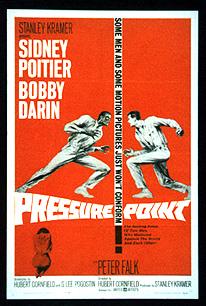A young, white Psychiatrist complains to his boss about his patient, one more time. It deals with the fact
that he has given up and pleads with the black doctor to remove him from the case because his young black patient is so full of
hatred for him. He cannot reach a point of contact with the boy because of it. He has been on the case for 7 and half months but
is ready to quit. The doctor says he quit his prison Psychiatrist job in a Federal prison 20 years ago for the same reasons. It
was the first really good job he ever had. "I do understand how you feel ...," he says.
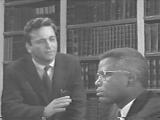
Flashback to 1942 ... the case that The Doctor will never forget. A 29 year old white psychopathic German-American Bundist who is
sentenced to 3 years in the prison for exciting a crowd to riot and trying to overthrow the United States Government. The Doctor
already had a 40 plus caseload of robbers and murders at the time but will NEVER forget meeting
him ... The Patient.

When the two meet, The Patient begans to laugh. He tells The Doctor right away he doesn't care what he thinks because he is a
Negro. The Doctor wants to know what he has against his race. The Patient in turn asks what did The Doctor have against whites.
The Patient tells The Doctor he can say he's crazy but he can't keep him there forever. The Doctor disagrees and based on The
Patient's history says it wouldn't be too hard to get him committed. The Doctor asks The Patient if he really, feels what he
believes. The Patient says he does and regards his setbacks similar to Hitler. The Doctor is very disturbed because everything
The Patient believes in and stood for alienated and repells him. On the basis of The Patient's history of being paranoid and
antisocial, The Doctor recommended The Patient should be roomed by himself to prevent him from spreading his ideas.


The Patient has made trouble ever since he arrived, fighting with Jews in the prison in the lunchroom. The Chief Medical
Officer asks The Doctor to have a longer talk with him. The Doctor is not too happy with that idea, feeling The Patient is not
very cooperative.


The Patient complains to The Chief Medical Officer that he cannot sleep and asks for a pill. He refers him to the Doctor.
The Doctor knows The Patient has black out spells. He tells The Patient he wants to help him, if he will LET him help him.

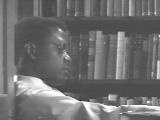
The Patient spouts off all his hatred against the black race saying that Negroes are no good and cannot be
doctors and psychiatrists. He tells The Doctor to go back to Africa.
The Patient asks for a pill to help him sleep. The Doctor tells him that his problem is not organic and asks for cooperation.
The Patient tries to explain his black out spells. He says he gets sick to his stomach, can't breathe, can't see and feels something
is coming down at him. The Patient panics as a black out spell begins, tries to leave and starts to pass out. It is then The Patient
asks for help and treatment begins.
During the many long months of analysis, The Patient reveals a frightening past. He was the only child in a marriage
that was created because of his conception. His father was a butcher and hated him, often hitting him. The Patient tells The
Doctor he would never cry after being beaten by his father, because he did not want to be weak like his mother. She spent her
time in bed, sick and depressed because of her loveless marriage, and made her son the sole object of her
affections.


The Patient was alienated by other children in his neighborhood because of his fathers publical drunken escapades. These
would also involve other women, who he would bring home from bars in front of The Patients mother, torturing her. Witnessing her pain,
the patient felt responsible for his mothers happiness but admits he never felt sorry for her, because she was weak. The Patient also
had a strong disrespect for authority as a child, but at the same time had a quick mind and did well in school. Not having friends,
The Patient regarded this as being "special." He daydreamed and had fantasies, including having an imaginary friend who he treated
as his father treated him. He also fantasized of killing his
mother.

The Patient often worked for his father in his butcher shop as a cashier, despite his intense fear of blood. His father knew of
this fear and in one intense episode his father taunts him with a piece of raw, bloody meat. The Patient left home at 15 years of
age and never returned, living in the streets.
The Doctor begins to feel some sympathy toward The Patient, who was out on his own at an early age. The Patient replies
that some of the jobs he took "weren't fit for a white man." The Patient offers a sarcastic apology in a patronizing way. The Doctor
angrily tells him he is here to help the him. He tells The Patient if he doesn't want his help, he can leave, those are the rules.
The Patient only responds with a blank stare.


The Doctor goes to The Chief Medical Officer and tells him he wants off this case as he feels unable to be objective. He says he
has worked with men who are sadistic killers who were more human than The Patient. The Chief Medical Officer offers some understanding and tells him that these are just symptoms of The Patient and for The Doctor not to take it so personally. The Chief Medical Officer
also tells him he has great faith in him and feels he has done and will continue to do a great job. The Doctor has justified his
expectations and surpassed them. He asks The Doctor not to let him down. "'Just because you're a Negro' is what he didn't say ..."
The Doctor thought to himself.
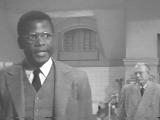
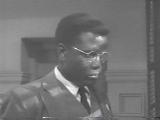
The Doctor, always a professional, knows his obligations and continues with his work.
In another session with the Doctor, The Patient talks about the best job he ever had. It was with a traveling construction
crew just before the Depression. He brags about smart he was, how he led the men he worked with and how they listened and obeyed him.
He asks The Doctor if he had ever played Tic-Tac-Toe. The Doctor said he had as a child. The Patient smiles and starts to tell how he
and his co workers once "really" played Tic-Tac-Toe.
The Patient begins to reminisce how he and his crew were in a "nothing" town inside a "crummy" speakeasy run by a "nothing" couple.
The men were very loud and drunk and enjoying their last night in town. The Patient starts to play Tic-Tac-Toe on the bar and the bar
owner tells him to stop, and offers him a piece of paper. The drunken Patient becomes angry and takes out his knife and begins
to carve his game on the bar. The bar owner really gets upset now, but The Patient threatens him with a knife and announces that his
friends will play Tic-Tac-Toe.



The men destroy the bar with white paint playing Tic-Tac-Toe games on every inch of the walls, floor and tables, as the bar owner and his wife watch
helplessly. When they are finished the other men go outside to continue their destruction leaving, The Patient and his friend Jimmy alone with the couple. The Patient makes the bar owner lay on the floor behind his bar. Then, The Patient and Jimmy play Tic-Tac-Toe
on the woman, using her lipstick.





"We Tic-Tac-Toed everything!" The Patient laughed to the stunned Doctor. In all those many months The Doctor had been uneasy,
he had been repelled but at this point he was frightened. The really frightening thing was The Doctor was not sure just WHAT
he was frightened of.
The Doctor then asked the Patient if he had ever had a meaningful emotional experience with a woman that wasn't entirely
physical. The Patient responded he had once "kinda" during the Depression. He had lost his construction job, and was selling apples
on the street.


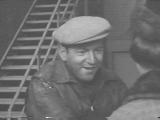
The Patient began to recall how an attractive girl approached him at his apple stand and seemed interested in him. She bought
all his apples and The Patient helped her take her bags home. He said she was very nice, was interested in what he had to say and he
even made her laugh. They soon arrived at her home. She lived in a beautiful Brownstone that was painted white. Her father was there
inside and didn't seem very friendly. But The Patient was astounded by the beauty and warmth of the house as he stood in the hall.
The girl, who had took the bags to the kitchen, came back and tried to tip him. He refused her
generosity but told The Doctor he has never met anyone so kind then, or since.
The next day it was very cold and the girl came to his apple stand again and offered him some chestnuts. She was obviously
very attracted to The Patient, he recalled in an almost surprised tone of voice. Her father saw them together from a distance on the
street and voiced his disapproval but the girl continued to stay by The Patients side, looking right into his eyes. She asked
The Patient to come to her house that night, if he cared to. The Patient was very excited about this.


When The Patient arrived at the girls house that evening he could hear the girl and her father arguing inside. The girl appeared
briefly at the door but was pulled away by her father. The father told The Patient he was not good enough for his daughter, and
slammed the door in his face. The last thing The Patient saw was the Star Of David on
the door.
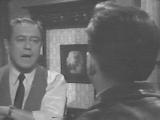
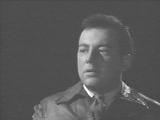
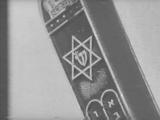
The Doctor then asked when the Patient joined the Nazi party. The Patient said it wasn't the Nazi Party but the
German-American Bund. The Patient attended a meeting and it all began.



Fresh from his rejection by the Jewish father, The Patient recalled how he was open to declare his allegiance to the evil
Adolf Hitler. The Doctor was concerned The Patient was not making sense and who was going to believe him. The Patient said he is
not ashamed of his beliefs and the cause he believes in. He tells the Doctor that his people need the Negro race for their triumph.
He believes if it wasn't for ongoing World War II that his people would be running the world. He says power creates fear, fear
creates hate, hate creates the enemy and the enemy fights back. Fighting back creates more interest. The Patient brags about all
the support his organization has received.
The Doctor finds it interesting that a man who can't stand blood now screams for it. The Patient continued to be excited about
his cause and how it cannot be stopped. The Doctor tells him it will be stopped because everything his organization believes in
was founded on a lie. The Patient retorts back saying that America was founded on a lie: "All Men are created equal." He gives painful
examples to the Doctor of how the Negroes are treated in 1942 and how they are walked all over in America. The Doctor then knew what
he was frightened of.


Soon after the start of the war, The Patient was arrested for advocating the violent overthrow of the United States Government.
In the next session, The Doctor asks The Patient about his blackout spells and how he feels before they begin. The Patient
says he is drowsy, sleepy and frightened, feeling as if he is going to die. The Doctor asks him about the mental picture of the
body in the sink that The Patient has told him about and if it has a face. The Doctor demands to know who the face belongs to.
The Patient starts to hallucinate again.



The Doctor demands again to know. The Patient finally says it is his father. The Doctor asks if the image is in every attack.
The Patient says no, before he saw himself. The Doctor asks if The Patient ever wanted to kill his father. The Patient says he used
to pray his father would die, and want to kill him. The Patient finally cries and winces in pain about the way his father treated
his mother.



The Doctor couldn't help thinking to himself that there are at least a million people in the world with similar backgrounds, with
bad or worse early childhood, who became a normal part of society. But The Patient had not. The Doctor then tells The Patient that the
image in the sink of The Patient and his father was interchangeable. The Patient was punishing himself for the desire to kill his
father in his fantasies. Soon the blackout spells disappeared and The Patient could sleep after realizing why he felt this way and
understanding the hatred of his father. The Doctor still thought he needed more treatment but truthfully he could not stand anymore
of The Patient. In one month, by his own accord, The Patient quit coming to the sessions.

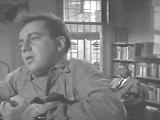
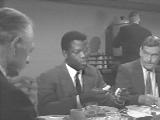
The Chief Medical Officer tells The Doctor that The Patient has become a model prisoner and praises The Doctors work.
He asks why The Doctor has not recommended The Patient for parole when everyone else had. The Doctor tells him The Patient is still
a Nazi and is still very dangerous and will not recommend his release.



The Patient excitedly enters the Doctors office to tell him he might be paroled that month. The Doctor tells him he will not
recommend him and that The Patient still has the same rotten ideas and notions he had 18 months ago. This makes The Patient angry. He
tells The Doctor those same ideas and notions are still believed in a lot of places by a lot of people.
The Doctor tells him he still has the mentality of a storm trooper. The Patient takes this as a compliment because he says those smart
storm troopers remade Europe by getting rid of certain people. He tells The Doctor how his people are plotting to get rid of the
Negroes in America. The Doctor asks for an apology. The Patient refuses.
The Doctor takes off his coat, ready to fight. The Patient finally gives an insincere apology. The Doctor tells him the reason
he apologized was because he felt rejected by The Doctor's refusal to recommend him for parole and The Patient felt persecuted, much
like his father had persecuted him as a child. So he attacked The Doctor's color, because he felt threatened by The Doctor's
authority. When The Doctor took off his coat, he was able to apologize. The Doctor offered to continue the sessions with The Patient.
The Patient said, "Yeah sure." Then he left.
The Chief Medical Officer and other officials discuss how they will have a discreet talk with The Patient to decide to if he
should be paroled. Just then, The Doctor calls The Chief Medical Officer asking where his faith is in him and tells him he still denies
parole to the patient and stakes his personal integrity on it, putting his job on the line.
In the meeting The Patient lies and says how much he has changed. He says he feels he owes the Jews and Negroes an apology. He
doesn't understand why The Doctor feels the way he does. The Doctor walks into the office to talk to the Chief Medical Officer and
is surprised to see The Patient. It seems the Chief Medical Officer and and Patient are turning against The Doctor, who feels on
trial.
The Chief Medical Officer doesn't understand why the Doctor is still against the Patient and asks The Doctor why, because
The Patient only has praise for what he has done for him. The Doctor says The Patient is lying and he has something to hide.
He says he is a clever liar. The Patient says he is not lying and knows why he won't recommend his release, claiming that the
Doctor thinks he is a "symbol" who is afraid of him and everything he represents. The Patient lies again saying
he has changed and the says The Doctor still has personal problems against him.


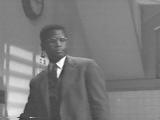
The Patient receives his parole. He comes by The Doctor's office, as The Doctor is packing to leave, to smugly say goodbye. On
his way out he says, "No hard feelings." And, that he is sorry about what he had to do, but didn't mean to cost The Doctor his job. The
Doctor says he didn't cost him his job. The Patient knows The Doctor is mad, and tells him he had told him all along how this
would end. The Patient knew that the people The Doctor worked with would wind up believing the, "White Christian American" instead of the
"Big Black Boy who was supposed to be running the place."


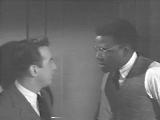
The Doctor finally explodes saying, that he did his job, he was a doctor and wanted to help him, despite of who The Patient was.
The Doctor took all The Patient's sick and dangerous beliefs, day after day. He then tells The Patient that America is his country and
that people who believe as The Patient believes and want to destroy it, will lose. He tells The Patient to leave and while he may
walk out the door, he is going nowhere.

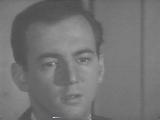

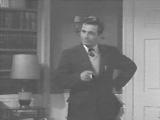
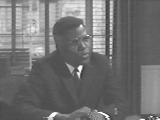
Back to 1962 ... The Doctor looks out the window as he finishes his story. The young Psychiatrist asks what happened to
The Patient. The Doctor says he was hanged 10 years later for beating to death an old man in the street, a complete stranger. He
tells the young Psychiatrist that he isn't saying his case with The Patient was worse than the one he was dealing with, but it
did put him under as much pressure as he's feeling with is own case and he didn't quit. The young Psychiatrist,
who feels braver now, jokes how he will go into the next session in black face. The Doctor replies, "That is
a good idea ... only don't let me down because you are a white man."

You can buy Pressure Point here.
|
Home | News | Bobby
| Career | Fun | Fans
| Specials
bobbydarin.net, All Rights Reserved.
|
